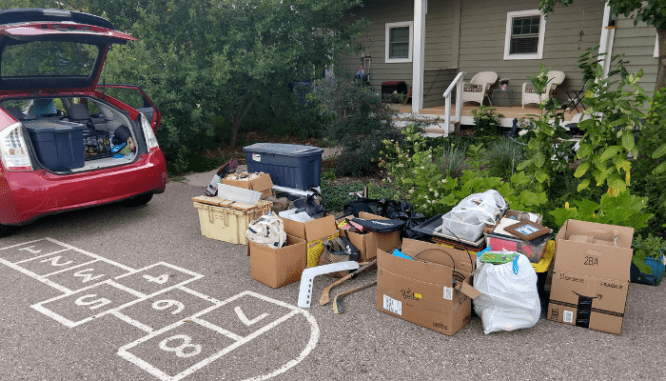10 Summer Moving Dos and Don’ts in the Summer, the Busiest Time to Relocate!
- Published on
- 6-7 min read
-
 Valerie Kalfrin Contributing AuthorClose
Valerie Kalfrin Contributing AuthorClose Valerie Kalfrin Contributing Author
Valerie Kalfrin Contributing AuthorValerie Kalfrin is a multiple award-winning journalist, film and fiction fan, and creative storyteller with a knack for detailed, engaging stories.
Summer marks the peak season for many big events, including vacations, weddings, and yes — the dreaded task of moving. According to an analysis by Movers Development, summer moving schedules have gotten so crazy that in recent years, more people have started targeting spring to avoid the rush. However, the flexibility summer offers to book a move around your kid’s vacation schedule or during a slower work period (not to mention the odds of securing a dry and sunny day to move) will make the season endure as an ever-popular time for moving.
As the pandemic eases up and Americans decide where they want to live the best version of their post-vaccine lives, summer 2021 is likely to drive more relocations, especially to places with nicer weather, better affordability, and less congestion. Meanwhile, returns to the office will bring some employees back closer to city centers, requiring them to find a residence without too long of a commute.
The toughest challenges for a summer move are hauling heavy items in the brutal heat, the speed at which mover calendars will book up, and the price surges that can result from such high demand. If you’re looking to change residences during the summer and plotting your warm-weather move, review our list of summer moving do’s and don’ts so you can plan the smoothest transition possible.

DO: Contact a moving company right away, even if you’re still firming up plans.
For the inside track on summer moving, we reached out to Gloria M. Pugh, CEO of AMWAT Moving Warehousing Storage in Tallahassee, Florida, and president of the Professional Movers Association of Florida. In her experience, it’s better to book a move sooner than later in the summer, even if your date is somewhat tentative when you make the call.
Many moving companies will allow you to put down a deposit to secure the date, time, and resources necessary to reserve your move. If your plans change, the company should be able to accommodate a shift. According to Pugh, “you won’t lose your deposit,” but you should check with each moving company’s individual policy to be sure.
If you’re trying to time a move around the closing date of your home sale, you should scope out a moving company as soon as you have a pending or accepted offer, advises Eric Forney, a real estate agent in Indianapolis where summer moves are highly popular considering the region’s harsh winters. This brings the movers onboard without it coming down to the wire, even if you need to firm up your details later in the process.
Keep in mind that a moving company in the summer might be booked at least a month in advance. When Pugh spoke to HomeLight in June, AMWAT’s earliest availability was mid-July.
In short, it’s never too early to start the conversation with your potential movers. “There are a lot of logistics to consider,” Pugh says. “We don’t just have crews waiting around for people who need to move that day.”
DON’T: Get taken to the cleaners by a bad moving broker.
Waiting too long to book a reputable mover adds pressure and increases the risk that you’ll pay more. It also opens the door for opportunists or what Pugh calls “rogue operators” looking to capitalize on the summer’s high consumer demand.
Some of these operators build an impressive website but don’t disclose to the consumer that they’re a broker who has no equipment or staff. Then, they sell your move to whichever company agrees to show up on your preferred moving day. The actual moving company may tack on more costs once they have your belongings loaded. In worst-case scenarios, the movers you end up with could also be unlicensed or uninsured.
To avoid pairing up with a bad mover in the heat of a summer moving craze, you need to know who you’re working with and perform some basic checks before you make a hire. Here’s a quick checklist to follow:
- Get your mover’s USDOT number.
To start, identify your mover’s USDOT number or MC number, which is a unique identifier assigned to moving companies by the Federal Motor Carrier Safety Administration (FMCSA). One of these numbers can typically be found at the bottom of the mover’s homepage, or you can ask a company representative directly for their USDOT. Then, plug that number into the FMCSA’s company search tool to pull up the operation’s full credentials.
- Look for whether the company is a broker or a carrier.
Brokers do not have their own trucks or moving pros, so you’re at the liberties of them handing off your move elsewhere. Carriers are equipped to directly move household goods. The “Fleet Size” section of your mover’s credentials will also indicate if a company has its own trucks, indicating carrier status.
- Check their insurance.
Follow the prompts on the FMCSA tool until you’re able to see a record for your carrier. From there, you should be able to download details about the carrier as an HTML or report version. On this page, check to see that the company has a “Yes” next to the bond and cargo insurance requirements. Bond insurance means the company guarantees the work will be performed while cargo insurance protects your household items up to a certain value.
- See if your mover is licensed for interstate or only intrastate commerce.
Any moving company that’s performing moves across state lines is required to have a USDOT number to operate, indicating it is licensed with the federal government and must comply with industry regulations. However, some states don’t require local movers to be registered with a USDOT number. In that case, if you’re moving out of state, your local movers will have to hand off your belongings to another company once it reaches state lines. If you’re working with a moving company that has no USDOT number, vet them extra carefully through their website and online reviews.
Rather than fly blind with your search for a mover, ask for recommendations from friends, relatives, neighbors, or your real estate agent for the best moving companies in the area. “Realtors® are a really great source of reference,” says Pugh. A great mover referral is doubly important in the summer when there will be companies looking to take advantage of your desperation during the busy season.

DO: Consult with the movers for a precise inventory.
The national average cost of hiring movers is $1,412, according to HomeAdvisor. This includes the cost of hiring movers locally (for a move of fewer than 50 miles), which runs about $600 to $1,650, and long-distance (more than 100 miles), which runs about $2,200 to $5,700, depending on distance and weight of your belongings. However, if you’re moving in the summer, MoveBuddha estimates that you can anticipate paying a 20%-30% summer premium due to heightened demand.
While you can’t always evade summer pricing due to the timing of your move, you certainly don’t want to blow your budget on top of the price surge. To keep your costs in check, an accurate estimate can help you gauge your spending from the start.
“A lot of moving companies tailor the move according to the client’s needs —not just lifting heavy items — but their overall budget,” Pugh says. Conducting a survey, also known as taking an inventory, in person or virtually via FaceTime or other means, opens this discussion and avoids surprises.
Granted, residents try to do a lot themselves during a move, but they rarely calculate the weight and volume of their belongings correctly — which one average lists at about 7,500 pounds.
“They miss about 50% of what’s in a house,” Pugh says. “Surveyors count how many items are attached to the wall. Every single chair. All the beds, sofas, all the frames. They estimate how many boxes for your closet, your kitchen, everything. Because we do this every single day, we’re on target.”
Miscalculate on a long-distance move, and the moving company might have to make a second trip, which adds to your overall expense.
DON’T: Sweat the utilities in an attempt to save a few bucks.
Let’s say you’re moving into a new house and the seller plans to be out by Friday at 5 pm. As the buyer of the home, you’ve agreed to take over the utilities by the exact time they leave. However, signals get crossed and you arrive Saturday morning in the dead of summer for your move, only to find that the house has no AC. Your movers aren’t sure they can complete the job in the heat without the relief of central air.
“When it’s ninety degrees or so outside, the last thing that you want is to not have your refrigerator or your air conditioner running,” says Forney, a top real estate agent in Indianapolis who’s seen his fair share of buyers pay the price for being cheap about the utility transfer.
“This is one of the silliest things that people squabble over,” Forney advises. “Just err on having a two-day overlap period, and convert the utilities later. If you’re the buyer and you pay for the seller’s utilities for two days, it’s a lot better than moving in the heat.”

DO: Provide the movers with water, sports drinks, or both.
Depending on where you live, you might be able to beat the heat by scheduling your move earlier in the day before the sun gets intense. But in the South and the Southwest, mornings can be broiling, too.
“We start at 8 a.m.,” Pugh says, adding that it’s tough to ask anyone moving to open their homes any earlier. “By 10 or 11 a.m., we’re already feeling it.”
Although a lot of professional movers send their crews out with coolers of water and sports drinks, as well as towels, these might not last through a full busy day. So keep some drinks on hand as a “good soul,” and “if you think they look hot, give them some water,” she says.
Because moving a 2,000-square-foot home might take four to five hours or longer, also identify a bathroom for your movers to use.
DON’T: Forget to make arrangements for small children and pets.
With the bustle of personnel and belongings coming and going with the doors left open, a pet that isn’t secured in a kennel could get loose in the neighborhood, or at least underfoot.
Young children often are fascinated by all the activity, but they too can get in the way. So if you’re in town, see if you can set up a playdate or ask someone to watch your pet for a few hours. For a long-distance move, designate an air-conditioned room where the youngsters and pets can hang out. If you’re unsure about the AC when moving far away, set up a few fans.
Be sure they (and you) drink plenty of water.

DO: Pack some items yourself to reduce the risk of damage.
The average move results in four broken or damaged items. During a summer move, it’s critical to think about which of your belongings won’t fare well in the heat, and talk with your mover about transporting them yourself. They can help you pack them safely in your vehicle. They also might recommend that you take any high-value items, such as jewelry, with you.
Remember, most moving trucks aren’t climate controlled because of the expense, and an inherent vice clause in company contracts states they cannot control temperature, Pugh says. This often isn’t an issue, even with items that consumers consider delicate, such as electronics, because of how movers protectively wrap items and load a truck like a jigsaw puzzle.
There are rare occasions where heat was so drastic that it caused wooden furniture to swell, but “we can’t be held responsible for that,” she says.
For an in-town move, pack your perishables in a cooler and transport them yourself to avoid worry about what might thaw on the truck. Give any plants a ride in your vehicle’s AC, as well.
Keep in mind: If there’s damage to an item you’ve packed but no damage to the box, the moving company is not liable for the damage, Pugh says.
DON’T: Underestimate how long preparing and packing takes.
While lots of customers say they’ll pack their own belongings to save money, they often get in over their heads and have only about half of everything packed on moving day. “Now, the estimate is going to increase significantly so my guys can move pictures and so on and find a new place to put these so they can pad-wrap the furniture,” Pugh says.
A professional moving crew can pack a house in a day, but they need the staff and the supplies to do so. Forty-eight hours before your scheduled moving day, call your movers and ask for help if you feel like time has caught up with you.

DO: Pack a box of essentials that you can find right away — including a fresh change of clothes.
Instead of rummaging around for a shower curtain, toothbrushes, toothpaste, and whatever else you might need on your first night, designate a box and perhaps a suitcase for these things — and let the movers know you want those off the truck first.
Be sure to include any medications, toilet paper, paper towels, and paper plates, as well as a few changes of clothes, especially if you’re carrying in items and unpacking in the heat, as well. “I know I’d be a mess if I was doing this myself,” Forney says.
DON’T: Forget to tip your movers if you’re satisfied with their service.
Because of the higher cost of moving in the summer, tipping the movers might seem like an added or outdated fee. But as On the Go Moving & Storage, a HomeAdvisor top-rated company that has served Seattle and western Washington State for more than 10 years, movers as part of the service industry have a lower base pay in anticipation of tips.
Tipping shows your appreciation, especially if the movers were efficient, punctual, cordial, and handled your possessions with care. For instance, if you expected a move to last five hours and your movers completed it with no issues within four, tipping each mover $4 to $5 per hour of work is appropriate.
After all, of 1,000 Americans surveyed about their last move, 43% handled everything themselves — and said they’d never do that again. Of those who hired a moving company, 94% said it was well worth the cost.

Finish this move so you can enjoy your summer!
It’s summer — and you’d rather be on a beach somewhere or sipping a cold glass of lemonade in your backyard. First, you need to get this move squared away. Given that this is the historically most popular window to move, mover schedules will book up fast and price surges aren’t out of the question. Plan ahead so that you have ample time to research your movers. Pack up your belongings well in advance, without scrambling or adding more to your bill. Most of all, be sure to take care of yourself, your family, and your movers if the heat gets to be too much.
Header Image Source: (Karolina Grabowska / Pexels)
